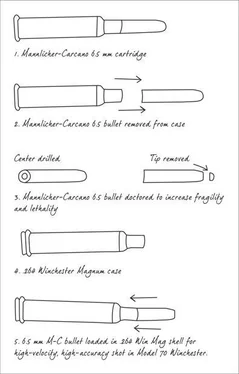Stephen Hunter - The Third Bullet
Здесь есть возможность читать онлайн «Stephen Hunter - The Third Bullet» весь текст электронной книги совершенно бесплатно (целиком полную версию без сокращений). В некоторых случаях можно слушать аудио, скачать через торрент в формате fb2 и присутствует краткое содержание. Жанр: Триллер, на английском языке. Описание произведения, (предисловие) а так же отзывы посетителей доступны на портале библиотеки ЛибКат.
- Название:The Third Bullet
- Автор:
- Жанр:
- Год:неизвестен
- ISBN:нет данных
- Рейтинг книги:5 / 5. Голосов: 1
-
Избранное:Добавить в избранное
- Отзывы:
-
Ваша оценка:
- 100
- 1
- 2
- 3
- 4
- 5
The Third Bullet: краткое содержание, описание и аннотация
Предлагаем к чтению аннотацию, описание, краткое содержание или предисловие (зависит от того, что написал сам автор книги «The Third Bullet»). Если вы не нашли необходимую информацию о книге — напишите в комментариях, мы постараемся отыскать её.
The Third Bullet — читать онлайн бесплатно полную книгу (весь текст) целиком
Ниже представлен текст книги, разбитый по страницам. Система сохранения места последней прочитанной страницы, позволяет с удобством читать онлайн бесплатно книгу «The Third Bullet», без необходимости каждый раз заново искать на чём Вы остановились. Поставьте закладку, и сможете в любой момент перейти на страницу, на которой закончили чтение.
Интервал:
Закладка:
Win, being a senior staffer, had a cubicle with three walls of privacy, which made my task somewhat easier, not that it wasn’t easy to begin with. Only a few staffers lounged about, none of them paying much attention to a familiar figure such as mine, and I opened his drawer and found my report and removed it, then pivoted slightly, opened two more drawers, and found what I was looking for in the second one, TOP SECRET/EYES ONLY meaninglessly stamped askew over the title PHONE TRANSCRIPTS/MEX CITY/SOV EMB and a ref to master file RP/K-4556-113M. I slipped this document behind my own legal document, locked everything up, and went back to my desk. I eased it into my briefcase for study at home, but not before seeing for the first time the name that would become so indelible to the lens of history in such a short time. And thus I met LEE HARVEY OSWALD.
My first encounter with him that night, after Peggy and I had enjoyed an old-fashioned and put the boys to bed and she retreated to her boudoir and I to my study, was not compelling. It was, in fact, repellent. I read through the interview transcripts recorded September 27 and 28, 1963, at the Soviet embassy, rm. 305G, at 1130 the first day and 1315 the next.
KGB: And why do you wish a visa?
LHO: Why, sir, I renounce capitalism and wish to raise my family in a society that values the teachings of Marx and the struggles of the workingman.
KGB: But you spent 21/2 years with us, Mr. Oswald, and you seemed at a certain point to have your fill of the teachings of Marx and the struggles of the workingman.
LHO: Sir, that was not my fault. I was undone by jealous people who hated me for my intelligence, for marrying the most beautiful woman, for the heroic will they sensed within me, as the great Lenin and Stalin were envied and hated by petty rivals!
I recognized almost everything I despised in a man. He was arrogant, which, combined with his manifest stupidity, made him particularly appalling. He was pugnacious, bellicose, yet quick to retreat and start sucking up aggressively. To watch the crude ploys of his personality over the play of the interview with Boris and Igor (in Agency argot, all Russian operatives, even if their names were known, as these were, went by the noms de guerre of Boris and Igor) was somewhat dispiriting. He’d throw himself at one until he ran into resistance, and then he’d throw himself at the other. On and on it went. They didn’t have to play Mutt and Jeff with him, only Mutt and Mutt.
From what I gathered – not having seen our files on him or the FBI’s – he was some kind of epic failure, having bungled every job ever handed to him, having offended every boss who ever hired him, having betrayed every friend who ever reached out to him. He had that classic ineffective personality, all front and bluster backed by nothing of substance, bravado for show, cowardice for content, a braggart and a phony, and I guessed that all he claimed for accomplishments would turn out to be lies, as they did. Throw in some other defects: an inability to concentrate, an exaggerated sense of grievance, an IQ that would be classified “dull normal,” no outstanding compensatory talent, and the little man’s classic resentment of all things in the universe larger than himself. He would be both a bully and a coward, a liar and a cheat, without charm or charisma, prone to true belief in nonsensical goals; in all, a human wreck waiting to happen. That would be my department.
He explained to them that his goal in life was to get to Castro’s Cuba, but the Cubans, sensibly, had declined. They had left him with a proviso that if he could get a visa from his good friends the Russians, they would allow him entrance on that document for a limited amount of time. Here he was, giving himself up to the maw of history in order to achieve the greatness he knew as his own and to claim his place in the socialist firmament.
It was a tough sell, particularly on the second day, by which time Boris and Igor presumably had been in contact with KGB Moscow, had seen synopsized accounts of LHO’s unspectacular two and a half years in Minsk and the no doubt unflattering comments on his personality and work ethic from so-called jealous people, and had reached the proper conclusion.
The reds are familiar with this oddity of the American system. It produces men who can move mountains, build industries, win global wars, and break the speed of sound. It can down MiGs over Korea at a six-to-one ratio. At the same time, perhaps inevitably, it produces a small number of malcontents, of ambitious dreamers who lack the skills or the diplomatic grace to achieve anything in life, and rather than face their own inadequacies, they blame some amorphous structure called “the system” and look for its opposite, where they believe they will shine. Then they spend their dream lives imagining themselves as secret agents, destined to bring down the larger apparatus and be rewarded by its opponents, whose conquest they have so wonderfully lubricated.
These odd birds know history superficially and never notice that the first thing a socialist totalitarian state does when it takes over is round up all the secret agents who have worked so hard in its interests, cart them to the Lubyanka by Black Maria at midnight, and plant a bullet behind their ears. Reds cannot tolerate traitors, even traitors who have aided their own cause. Ask the Poumistas of the Spanish revolution, who made that discovery while standing at the execution wall in Barcelona.
Oswald knew or cared for none of this. He was determined to be a traitor, though he had nothing of value to offer his new friends, failing completely to master the nuance that treason was a negotiation and that it takes two to trade, and had failed miserably at his first attempt. Little mongrel. How I loathed him that night, sitting in my study in Georgetown, listening to the midnight crickets and enjoying a splash of vodka.
Then came the key exchange, late on the second afternoon, after they’d already given him their negative decision and before calling in the goons to eject him from the property forcibly when he’d come back to protest.
I gathered that neither Boris nor Igor was there, and this new fellow – we’ll call him Ivan – was a little higher in the KGB tree. He seemed wiser, smoother, less awkward in dealing with the screwball American. Ivan tells him, “Mr. Oswald, it is our conclusion that you would not be happy in the Soviet Union a second time any more than the first. My own recommendation is that you could most appropriately serve the revolution from within your own borders, pursuing these activities you have mentioned, such as passing out leaflets for the Fair Play for Cuba Committee and arguing passionately in private with American citizens on the merits of our system versus yours.”
LHO: Sir, do you know who you’re talking to? I am not some stupid pamphleteer, not by a long shot. I am a soldier of the revolution, I am a man of action.
KGB: Here, now, Mr. Oswald, please settle down, we do not need an incident.
LHO [crying]: No, you listen to me. On April 10, I was the sniper who took the shot at General Walker, fascist, traitor, bully, would-be tyrant, enemy of the left, of socialism, of Cuba, of the USSR. That was me in the dark, with my Eye-tie [?] Mannlicher-Carcano six-five. BANG, I had him dead center, I just didn’t see the window frame that deflected the shot. Me, I, me, I went to war for us and for you. I risked prison, the electric chair, I–
KGB: Mr. Oswald, please, get hold of yourself, there’s no need–
A few minutes later, he would pull a gun and begin to gesticulate wildly, then break down, sobbing on Mr. Big’s desk! It ended with him deposited in the Mexico City gutter. What did he expect? How deep could his self-knowledge have been? He had no awareness that the nakedness of his needs and the tragedy of his incompetence were the signals he broadcast the loudest; he had no idea of the ocean of space between the ideal image of the self he wished and pretended to be and the tragic, limited, feckless little twerp whom he forced the world to see up close and instantly. He was a mess.
Читать дальшеИнтервал:
Закладка:
Похожие книги на «The Third Bullet»
Представляем Вашему вниманию похожие книги на «The Third Bullet» списком для выбора. Мы отобрали схожую по названию и смыслу литературу в надежде предоставить читателям больше вариантов отыскать новые, интересные, ещё непрочитанные произведения.
Обсуждение, отзывы о книге «The Third Bullet» и просто собственные мнения читателей. Оставьте ваши комментарии, напишите, что Вы думаете о произведении, его смысле или главных героях. Укажите что конкретно понравилось, а что нет, и почему Вы так считаете.












